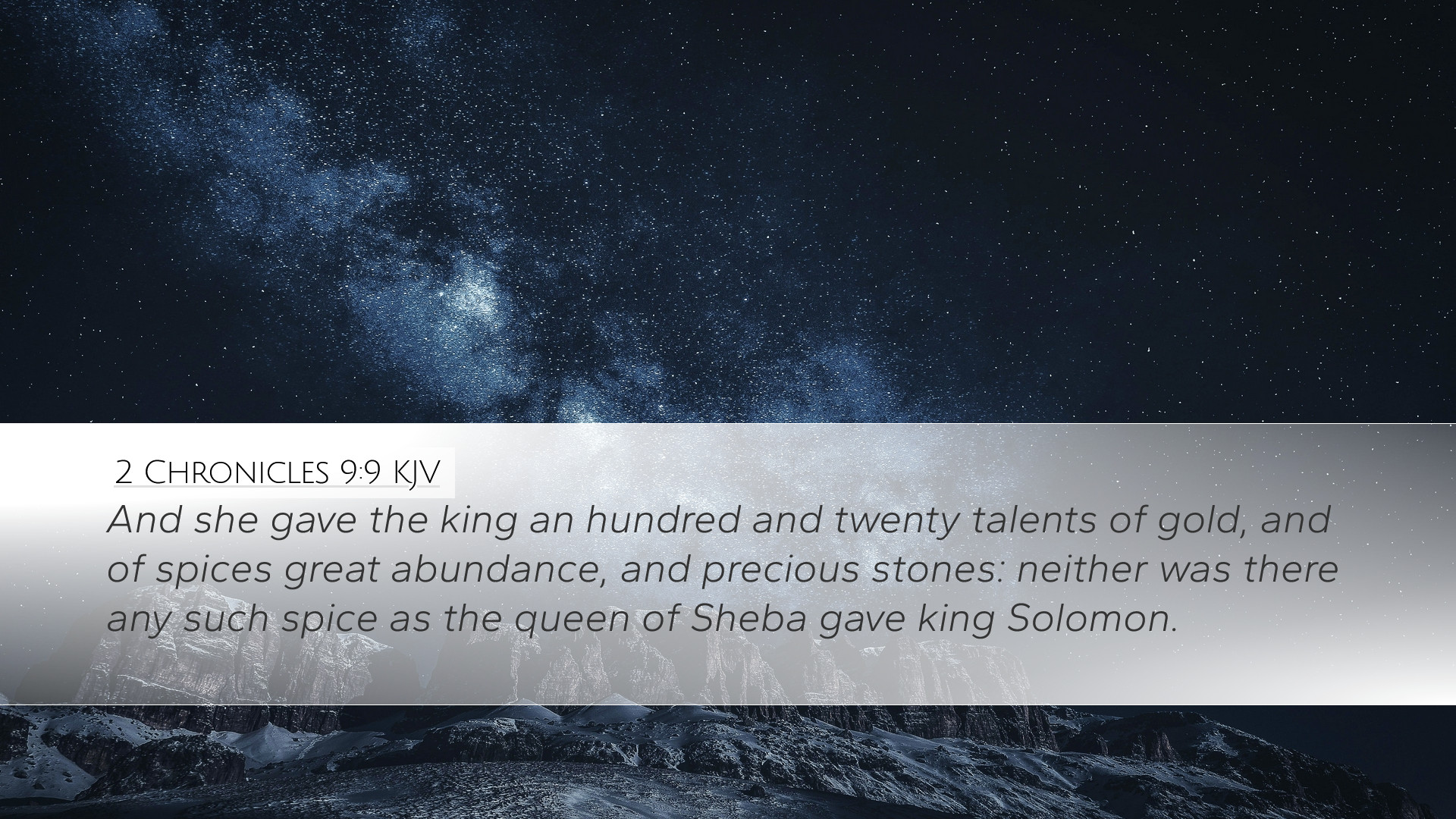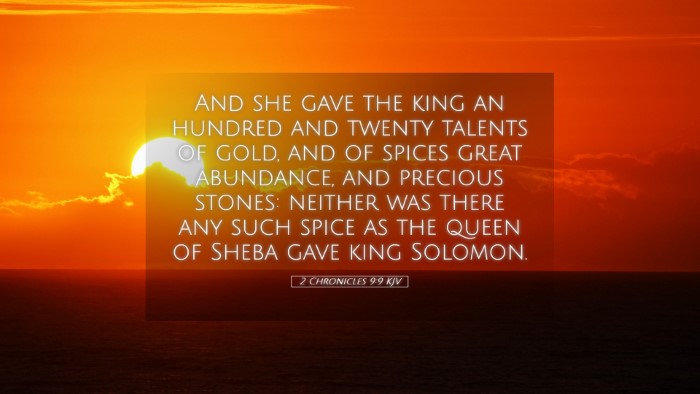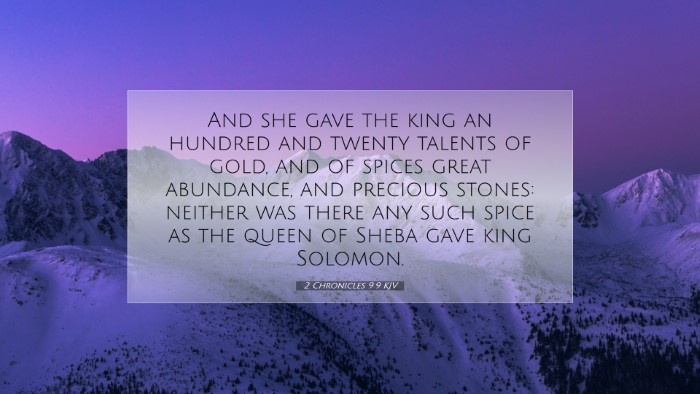Commentary on 2 Chronicles 9:9
Verse Text: "And she gave the king an hundred and twenty talents of gold, and of spices great abundance, and precious stones: neither was there any such spice as the queen of Sheba gave king Solomon." (2 Chronicles 9:9)
Introduction
This verse recounts the visit of the Queen of Sheba to King Solomon, highlighting her gifts and the significance of her tribute. The encounter is emblematic of the glory and wealth of Solomon’s reign as well as the recognition of his wisdom and the God who endowed it. Commentators like Matthew Henry, Albert Barnes, and Adam Clarke provide profound insights that illuminate the historical, theological, and cultural context of this scripture.
Contextual Background
This passage is situated within the historical narrative of Solomon’s reign, noted for its unprecedented splendor. The visit from the Queen of Sheba, a foreign dignitary, illustrates not only Solomon’s wisdom but also the international respect he commanded.
- Historical Significance: The visit from Sheba, likely in Arabia, indicates a diplomatic engagement and the extent of Solomon’s influence.
- Theological Implications: The honor given to Solomon signifies the fulfillment of God’s promise of wisdom and wealth as a reward for his initial supplication for an understanding heart.
Commentary Insights
1. The Gifts of the Queen of Sheba
Matthew Henry stresses the substantial nature of the gifts, noting that “one hundred and twenty talents of gold” denotes not merely wealth but the recognition of Solomon’s sovereignty. This act of tribute signifies a relational dynamic where external kings acknowledged Israel’s God-given authority.
2. Abundance of Spices
Henry further points out that "spices of great abundance" symbolizes not just a material offering but extensive admiration for Solomon's wisdom and the divinely established order of his kingdom. This reflects the ancient world’s values, where the rare and precious had implications far beyond economics. It represented a form of worship and reverence for the wisdom that was recognized as divine.
3. Precious Stones
According to Adam Clarke, precious stones in the biblical context often symbolize the beauty and majesty of God’s creation. The Queen of Sheba’s offerings thus also symbolize an acknowledgment of God’s splendor manifest in Solomon's reign.
4. Uniqueness of the Tribute
Albert Barnes highlights the latter part of the verse, underscoring that “there was no such spice as the queen of Sheba gave king Solomon.” This statement not only emphasizes the uniqueness of the gifts but also serves to elevate Solomon and the God he serves. It suggests that such honors were unparalleled, affirming Solomon's unrivaled status.
Theological Reflections
The gifts from the Queen of Sheba invite deeper theological reflection on the nature of worship and recognition. They remind us that acknowledging God’s authority and wisdom ought to be accompanied by our offerings, not just materially but also spiritually and relationally.
- Worship as Recognition: The tribute underscores the concept that true worship involves recognizing God’s sovereign authority over all nations and peoples.
- Acts of Tribute: In bringing gifts, the Queen modeled the appropriate response to divine wisdom, urging the faithful to consider their contributions in service to God’s kingdom.
Applications for Today
Pastors, theologians, and students of the Bible can draw practical applications from this passage in their ministry and scholarship.
- Understanding Diplomacy and International Relations: Just as Solomon and Sheba engaged in meaningful dialogue and exchange, modern leaders can seek wisdom in diplomacy that's respectful and honors God.
- Encouragement to Seek Wisdom: Solomon’s legacy reminds us that true wisdom—rooted in reverence for God—is a treasure worth pursuing. This verse prompts reflection on our sources of wisdom and whether they align with biblical principles.
- Generosity and Worship: The gifts given by Sheba prompt the question of what we are willing to offer in reverence and worship to God. How do we manifest our gratitude and acknowledgment of His wisdom in our lives?
- A Call to Recognition: As Solomon recognized God’s gifts to him with humility, we too should reflect on God’s bounty and grace in our own lives, encouraging us to respond with thankful service.
Conclusion
The visit of the Queen of Sheba to King Solomon, encapsulated in 2 Chronicles 9:9, serves as a rich tapestry of historical significance, theological insight, and practical application. By studying the gifts she brought, we learn about the nature of true honor and worship, encouraging believers to bring their best offerings to God in recognition of His supreme wisdom and authority. As echoed in the teachings of Matthew Henry, Albert Barnes, and Adam Clarke, this narrative calls us to a deeper engagement with both Scripture and our reflections in our contemporary contexts.


